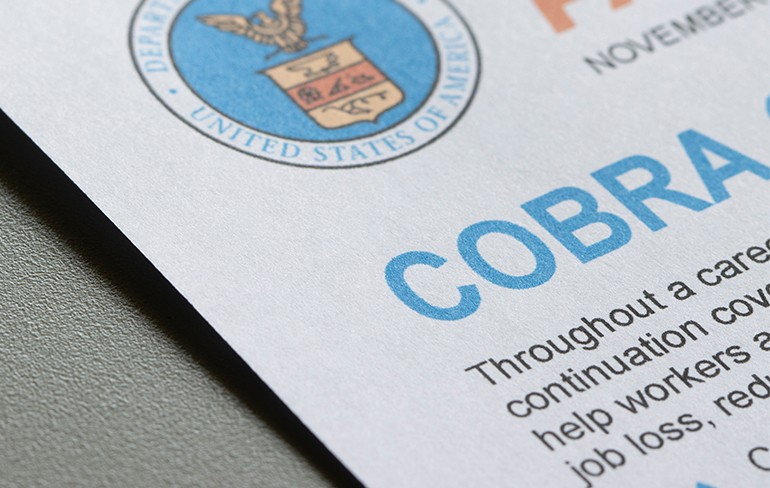I am not sure how many blogs have started with, "________ is SO hard to understand," but here we are again. COBRA is complicated and even more so when discussing Medicare. Thankfully, Medcom's Senior Legal Counsel, Michelle Barki, helped us out this week with a feature article from Medcom's quarterly Benefits Leader newsletter. If you find this article helpful (which I have no doubt you will) then subscribe to our email list at the top of the site!!
Now, on to Michelle's article:
Understanding COBRA and Medicare
Medicare, Eligibility, Entitlement
Medicare, Part A and B, is available for individuals who work for ten years (forty quarters) and paid Medicare Taxes. Otherwise, one may still be able to get Medicare by paying a much higher premium. Eligibility typically occurs at age 65, and automatic enrollment occurs only if the individual receives Social Security or benefits under the Railroad Retirement Board. If this is the case, a Medicare card is mailed to the individual 3 months before their 65th birthday. Otherwise, eligible individuals must enroll. Typically, there is an enrollment period of seven months, three months before the 65th birthday, the birthday month, and three months after reaching 65.
Medicare entitlement is quite different than being Medicare eligible. The terms are not used interchangeably in Medicare regulations and should be noted as differing in definition. Generally, entitlement requires that one be eligible and enroll in Medicare, whereas eligibility means one has met all the entitlement requirements but has not yet enrolled. See, e.g., 42 CFR § 406.3.
Anti-Age Discrimination Laws
Several Federal Laws prevent age discrimination in the workforce. These laws include ERISA, The Age Discrimination of Employment Act of 1967, and the Older Worker Benefit Protection Act of 1990. Also, under 42 CFR 411.108, an employer is prohibited from terminating coverage because an individual is entitled to Medicare. Therefore, employers must offer the same medical benefits to employees who are 65 years and older as they are for those who are younger. Should the more senior employee enroll in Medicare and the Group Health Plan, Group Health Plan is the primary payer. Medicare is the secondary payer if the employer has twenty or more employees. For employers with less than 20 employees, Medicare is primary. In short, the primary/secondary payer rules favor Medicare when it comes to active employees and keeps the cost of Medicare down. The Medicare Primary/ Secondary Rules provide penalties if an employer tries to “entice” a Medicare-eligible employee from dropping the group health plan in favor of Medicare.
COBRA
The question as to COBRA eligibility is based on the factors explained above. Also, under 42 CFR 411.108, an employer is prohibited from terminating coverage because an individual is entitled to Medicare. In short, as stated above, if you have an active employee who becomes entitled to Medicare, you must continue to offer benefits. If the employee then terminates employment, COBRA rights apply, and the employee must be offered COBRA benefits. However, please note if the employee voluntarily terminates his employee benefits when he becomes entitled to Medicare, none of the qualified beneficiaries are entitled to COBRA. The termination is not a qualifying event but rather a voluntary withdrawal. Therefore, be careful of the employee who, at age 65, decides to drop the group health plan and thinks his spouse, who is younger, is entitled to COBRA.
On the other hand, if the employee is no longer working and already on COBRA when becoming entitled to Medicare, COBRA benefits can be terminated at that time, if this is the employer’s policy. Employers must include clear communication about the procedure to employees in the notices. Other qualified beneficiaries will continue to be eligible for COBRA. The question thus becomes; what comes first, Medicare Entitlement or COBRA.
The next issue is employees who decide to retire at 65, but rather than taking Medicare Part B, decide to take COBRA. There are penalties for late enrollment into Medicare when employees are no longer active employees and are on COBRA, so employees who are not actively at work should be mindful of the potential consequences.
MEDCOM BENEFIT SOLUTIONS ADVISES THAT ALL EMPLOYEES WHO ARE NEAR ELIGIBILITY FOR MEDICARE COVERAGE TO SPEAK TO A MEDICARE REPRESENTATIVE.
Michelle Barki, Esq.CHP, CSCS, CCSA
Senior Legal Counsel
Medcom Benefit Solutions





